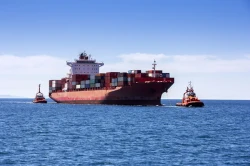Overview of International Shipping
2024-04-17
International shipping involves the transportation of goods between countries or across international borders. It plays a crucial role in global trade, enabling businesses to import and export goods, reach new markets, and access a diverse range of products. Here's an overview of international shipping and its key components:
1. Modes of Transportation:
- Ocean Freight: Shipping goods by sea is one of the most common and cost-effective modes of international transportation. It involves transporting cargo in containers aboard cargo ships. Ocean freight is suitable for transporting large volumes of goods over long distances, especially bulky or heavy items.
- Air Freight: Air freight involves transporting goods by airplanes. It offers fast transit times and is ideal for time-sensitive shipments, perishable goods, and high-value items. Air freight is generally more expensive than ocean freight but provides expedited delivery for urgent shipments.
- Land Freight: Land freight involves transporting goods by road or rail across international borders. It is often used for transporting goods to and from neighboring countries or regions with well-developed road and rail infrastructure.
2. Shipping Documents and Regulations:
- Commercial Invoice: A commercial invoice is a document that provides details of the goods being shipped, including their description, quantity, value, and terms of sale. It is used for customs clearance and import/export purposes.
- Bill of Lading: A bill of lading is a document issued by the carrier (e.g., shipping line or airline) that serves as a receipt for the goods, evidence of the contract of carriage, and title document. It provides details of the shipment and serves as a legal document of ownership.
- Customs Clearance: International shipments are subject to customs regulations and clearance procedures imposed by importing and exporting countries. Customs clearance involves submitting required documentation, paying duties and taxes, and complying with import/export regulations.
- Incoterms: Incoterms (International Commercial Terms) are standardized trade terms that define the responsibilities and obligations of buyers and sellers in international transactions, including the allocation of costs and risks associated with transportation and delivery of goods.
3. Freight Forwarding and Logistics:
- Freight Forwarders: Freight forwarders are companies that specialize in arranging and managing international shipments on behalf of importers and exporters. They handle logistics, documentation, customs clearance, and transportation arrangements to ensure smooth and efficient delivery of goods.
- Logistics Providers: Logistics companies offer a range of services, including transportation, warehousing, inventory management, and supply chain optimization, to facilitate international shipping and streamline global supply chains.
4. Supply Chain Visibility and Tracking:
- Supply Chain Visibility: Implementing supply chain visibility solutions allows businesses to track the movement of goods throughout the international supply chain, providing real-time visibility into shipment status, location, and estimated arrival times.
- Tracking and Tracing: Shipping carriers and logistics providers offer tracking and tracing services that allow shippers and consignees to monitor the progress of their shipments online or through mobile apps. Tracking information includes shipment status updates, transit times, and delivery confirmations.
International shipping involves complex logistics, regulations, and documentation requirements. Working with experienced freight forwarders, logistics providers, and customs brokers can help businesses navigate the challenges of international trade and ensure successful and cost-effective shipping operations.



